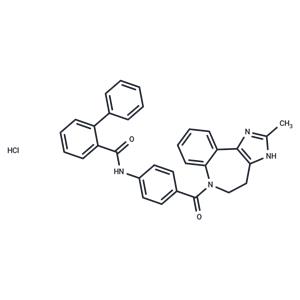| Name | Conivaptan hydrochloride |
| Description | Conivaptan hydrochloride (Vaprisol) is an orally active vasopressin V2 and V1A receptor antagonist, used in the therapy of hypervolemic hyponatremia and euvolemic. |
| In vivo | Conivaptan administered intravenously at doses of 0.03, 0.1, and 0.3 mg/kg increases urine volume and decreases urine osmolality in a dose-dependent manner in both myocardial infarction and sham-operated rats. In myocardial infarction rats, a dose of 0.3 mg/kg notably lowers right ventricular systolic pressure, left ventricular end-diastolic pressure, reduces lung/body weight ratio, and right atrial pressure, while significantly enhancing dP/dt(max)/left ventricular pressure. Additionally, conivaptan acutely augments urine volume, reduces osmolality, and at study conclusion, cirrhotic rats treated with the V(1a)/V(2)-AVP receptor antagonist exhibit neither hyponatremia nor hypoosmolality. It also normalizes sodium urine volume without impacting creatinine clearance or arterial pressure. At dosages ranging from 0.01 to 0.1 mg/kg i.v., conivaptan demonstrates a dose-dependent diuretic effect in dogs, effectively inhibits vasopressin-induced pressor effects, and at 0.1 mg/kg, substantially blocks vasoconstriction from exogenous vasopressin. Furthermore, at 0.1 mg/kg i.v., it significantly enhances cardiac function in dogs with congestive heart failure as demonstrated by increases in left ventricular dP/dtmax, cardiac output, and stroke volume, alongside significant reductions in left ventricular end-diastolic pressure and total peripheral vascular resistance. |
| Storage | Powder: -20°C for 3 years | In solvent: -80°C for 1 year | Shipping with blue ice/Shipping at ambient temperature. |
| Solubility Information | Ethanol : 7 mg/mL (13.08 mM), Sonication is recommended.
DMSO : 99 mg/mL (185.03 mM), Sonication is recommended.
10% DMSO+40% PEG300+5% Tween 80+45% Saline : 3.3 mg/mL (6.17 mM), Sonication is recommended.
|
| Keywords | YM-087 | YM087 | VasopressinReceptor | vasopressin receptor 2 | vasopressin receptor 1a | Vasopressin Receptor | Inhibitor | inhibit | Conivaptan hydrochloride | Conivaptan Hydrochloride | Conivaptan |
| Inhibitors Related | Atosiban acetate | OPC-51803 | Felypressin acetate | Balovaptan | d[Cha4]-AVP acetate(500170-27-4 free base) | Nelivaptan | TASP0390325 | E-4177 | Terlipressin Acetate | Fuscoside | Conopressin S acetate(111317-90-9 free base) | Tolvaptan |
| Related Compound Libraries | Failed Clinical Trials Compound Library | Bioactive Compound Library | Membrane Protein-targeted Compound Library | Anti-Cancer Clinical Compound Library | Drug Repurposing Compound Library | Inhibitor Library | Anti-Cancer Approved Drug Library | FDA-Approved Drug Library | Bioactive Compounds Library Max | GPCR Compound Library | Anti-Metabolism Disease Compound Library | Anti-Cancer Drug Library |

 United States
United States






